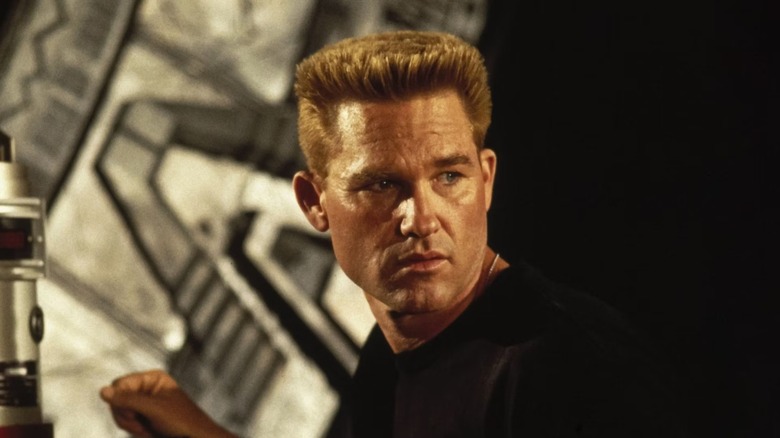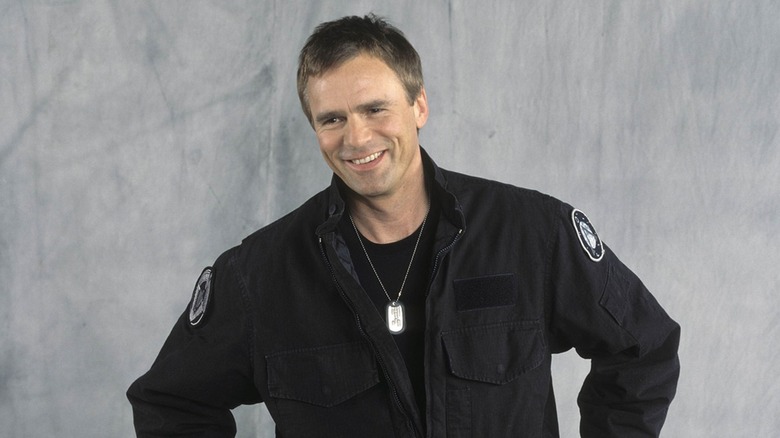In Roland Emmerich’s “Stargate,” Special Operations Colonel Jack O’Neil (played by a brilliant Kurt Russell) is as blunt as it gets. When linguist Daniel Jackson (James Spader) is invited to assist with the Stargate mission, O’Neil is frank about his disdain for an outsider involved in such a top-secret mission and exhibits little empathy when Jackson is forced to deal with an ancient civilization alone. However, when things go south, O’Neil is the first to dive into the jaws of danger, guns blazing, taking the initiative to save Jackson from the clutches of the malicious alien, Ra (Jaye Davidson). “Give my regards to King Tut, a**hole!,” he yells before crushing an elevator on top of Ra’s men to buy enough time for Jackson to get Sha’uri (Mili Avital) to safety.
Although “Stargate” does not offer anything novel in terms of premise, it is a fun sci-fi adventure that mixes historical myth with extraterrestrial fantasy, with Spader and Russell’s characters injecting enough personality into a film that could have been even less memorable. O’Neil is the clear standout character here, as the action sequences come alive whenever he’s on-screen, offering a perfect tonal balance to Jackson’s cerebral approach to conflict, molding them into a formidable duo.
While “Stargate” did not perform well enough to warrant the making of two pre-planned sequels, the television spin-off series — Brad Wright and Jonathan Glassner’s “Stargate SG-1” — aired for 10 years while accumulating a loyal, dedicated fanbase. Re-casting Jack O’Neill (with an extra L) for the series was a daunting task, as filling in Russell’s shoes would prove risky, even if the character was loosely based on the no-nonsense colonel in Emmerich’s 1994 film.
Jack O’Neill’s character underwent changes in Stargate SG-1
It was Richard Dean Anderson who eventually stepped into the role of Jonathan O’Neill (affectionately dubbed Jack or John), investing the familiar character with incredible depth and levity over the course of 10 seasons. This version of O’Neill was both self-sufficient and self-effacing, harboring vulnerabilities that were allowed to brim to the surface often, which he attempted to suppress with his dry sense of humor. It was actually one of Anderson’s conditions to make O’Neill funny to some capacity when he came on board —- which series co-creator Glassner went into detail in an interview with “Dial the Gate,” while talking about re-casting Russell’s memorable role (via SYFY):
“I’ve gotta give credit where credit is due: That was [MGM president] John Symes […] He thought we were gonna hate the idea — I don’t know why he thought that! — but he came to [co-creator] Brad [Wright] and I and he said, ‘How would you feel about Richard Dean Anderson playing Jack?’ And both of us immediately said [scoffing] ‘Well yeah! …Can we afford him?'”
Glassner went on to state that Anderson wanted to approach the role in a specific way, and wanted Jack’s character to have a humorous aspect while making sure that he felt more like a part of a team rather than an aloof leader taking the limelight. These changes worked in favor of the character’s transition to the small screen, as it made sense for someone like O’Neill to possess sarcastic, dry humor, who allowed everyone on the team to shine instead of asserting his superiority. Little details about his character, such as his immense love for cake and tendency to call hostile alien races by silly nicknames, helped humanize O’Neill over the seasons, making him seem more than just the stoic, serious leader of the SG-1 unit.
Glassner also added that working with Anderson was “great, not just as an actor, but as a person,’ as “he was just fun to work with.” This sense of camaraderie is reflected onscreen, as the chemistry between the characters has always made “Stargate SG-1” feel like a well-oiled machine, even when the series struggled to progress or was forced to run on fumes.
“Stargate SG-1” is currently streaming on Pluto TV.




